"You won't know who to trust" –Gregor "Greg" Ivanovich, "Cultural Attache"
Not memorable as quotes go, I know... But seeing as how poor "Greg" was shot seconds later by a man pretending to be an FBI agent just so someone else could take the rap for his demise, that simple statement encapsulates the core of any self-respecting spy yarn. Like a matryoshka doll, a good spy story is never about outward appearances. It is a tale within a tale, with the parts you can't see or don't know about as pertinent as the ones in plain view. And no game this pig has played fulfills that concept better than Alpha Protocol.

With a multi-layered, intriguing plot, a cast of memorable characters, solid stealh/action gameplay and the unparalelled abiltiy to Play As You Like, it baffles me to this day why – upon its 2010 release – all anyone could write about this Obsidian gem was that the lead character crouched funny (a sad, but perhaps accurate, glimpse into the demeanor of – if not the gaming community at large – then game reviewers in particular).
I think people mistakenly compared AP to games like Metal Gear Solid or No One Lives Forever (action games with spy elements); with most reviewer criticisms leveled at "unrefined gunplay", "simplistic combat", "sub-par boss fights", and "artistically uninspired graphics" – surface fluff that had little to do with what AP was trying to accomplish... Which is not to say that the game was without flaws or bugs (though, honestly, flaws and bugs are sort of an Obsidian staple).
On top of unjust criticisms, poor AP had the misfortune of being released a scant 4 months after Mass Effect 2 basically turned the whole action RPG genre upside down. It's not a fair comparison, to be sure (ME2 was more action than RPG, whereas AP was the other way around); but it's not called the gaming industry because everyone is objective and fair.
Still, a human I respect once told me that, given the choice between something well-designed that lacks polish and something visually flawless but ill-thought-out, Good Design will triumph in the end. And given that, 12 years later, AP retains a substantial following and is still remembered fondly, Good Design seems to have prevailed here as well.
In Alpha Protocol, you play Michael Thorton – an agent inducted into a secret organization that intervenes in world affairs when the stakes are too high for amateurs like the military, letter agencies or governments. Your mission (should you choose to accept it) is to find out how terrorists got their hands on a cutting-edge missile they used to shoot down an airliner. You are to uncover out how a defense contractor's product fell into terrorist hands and stop them from causing greater harm. And if that sounds like a simplistic premise for a spy thriller – fear not: the moment you start digging into the situation, the hole you are in all but collapses on top of you.
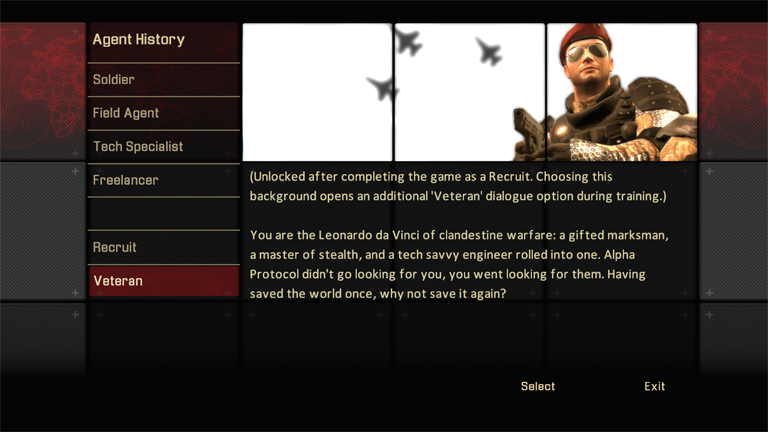
While you are destined to play Michael Thorton who Michael Thorton is is entirely up to you. To begin with, you pick one of five available backgrounds. Mike can be a 1) Soldier (shoot first, ask questions never), 2) Field Agent (softly, softly, catchee monkey), 3) Tech Specialist (with a gadget belt to shame Batman), 4) Freelancer (a blank slate), or 5) Recruit (a blank slate template). If you play the Recruit background to completion, the option of 6) Veteran (been there, done that) becomes available.
Backgrounds 1-3 preset your character's skills (though you can change them, if you want), while the Freelancer gives you a pool of points to spend as you like. The Recruit starts with no points (to reflect your lack of experience); while the Veteran starts with 3 points in everything ('cause it's all old hat).
All backgrounds also offer unique dialogue and NPC responses in certain situations to further reinforce your character's origin (something not many games at the time considered, which has since become fairly commonplace).
Once your Mike Thorton is ready, you go through a tutorial level and are then carted off to Saudi Arabia, where things (as you may well guess) Do Not Go According To Plan.
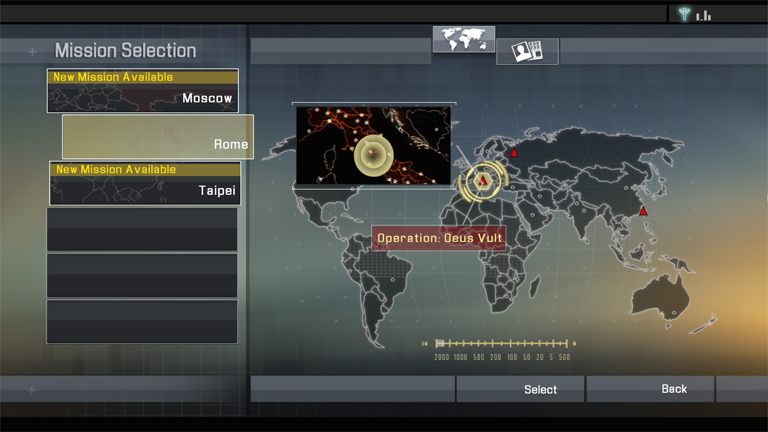
As the story is such a big part of what makes AP great, I won't go into too much detail about the plot. Suffice it to say, after Saudi Arabia, you go around the globe trying to Get To The Bottom of Things, visiting Rome, Moscow and Taipei.
Every time you arrive at a new hub, you begin in your safehouse where you can resupply, customize your gear, gather intel, watch some TV (which sometimes mentions your exploits), and decide which mission to tackle next. You can also change the appearance of your Thorton by visiting a mirror in the bathroom.
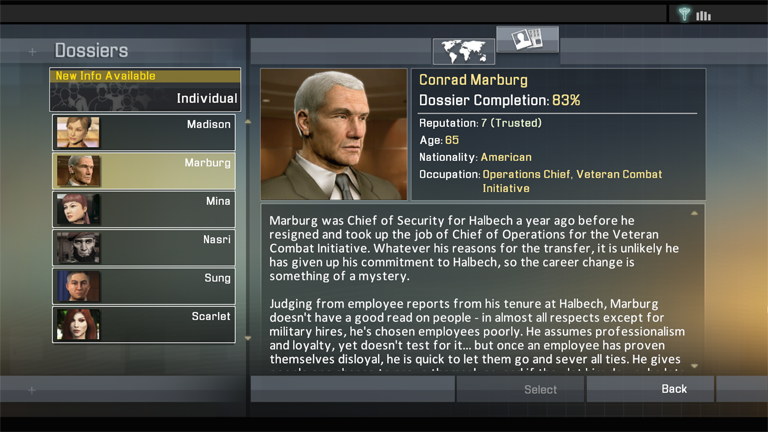
This initial stage, where you are still reconnoitering and gathering intel, is always my favorite. Meeting contacts is handled via a timed conversation vignette, where you have a few seconds to decide which dialogue option to go with. Reading up on a contact's dossier can offer insight into what they will react well to and what will rub them the wrong way. Act brashly around a veteran merc who values discretion and your relationship with him will suffer. Charm a local arms dealer and he might give you a discount.
And the thing is, dialogue matters here. Unlike Mass Effect, where dialogue options were often just different ways to arrive at the same conclusion, in AP how you treat characters can have very real consequences later in the game. In terms of choices that are tough and that influence the game in some way, I think AP's treatment was first-rate, with every one of your actions changing the game in small (or extremely unsubtle) ways.
Hubs also give you a chance to purchase intel, which gives you small insights into the opposition or the layout of a given mission. Some intel may come in the form of background info or secret items, others may result in a strategically-placed sniper rifle being available once the mission begins. You can also change your armor and weapon loadout, customize your weapons, and decide which gadgets you bring with you into the field.
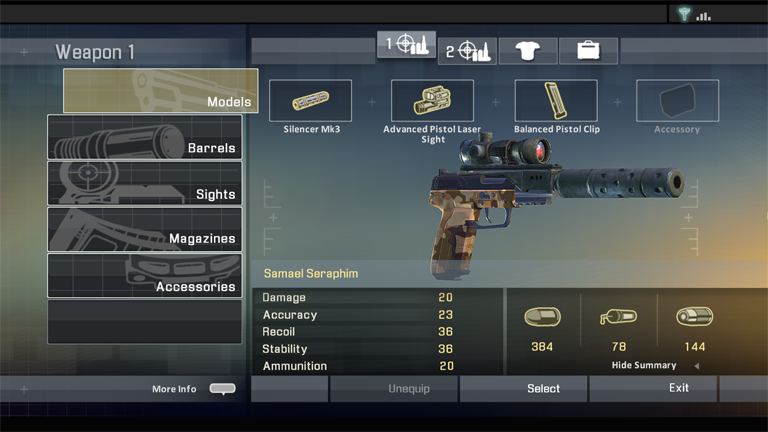
Weapon customization has a real effect on how your firearms handle. Because AP is an action RPG, the accuracy of your weapons is not simply a matter of your (the Player's) accuracy, but rather a compound equation where your reflexes constitute only a part of whether a shot hits or not. Like in DeusEx your character's proficiency with a weapon and how the weapon is set up are what determines overall accuracy (which I thought was neat).
Once you have made contact with local assets, stocked up on ammo, gathered all the intel you will need and modified Mike's loadout to your liking, it's time to tackle the actual missions.
For as much as I love this game, I will concede that the action portions of it take some getting used to. Controls are a little stiff, and it takes a some time to discover the kinks in the gameplay. AP is a great RPG first — action game second, after all.
But once you get the hang of it, it is possible to play smoothly without getting nasty surprises (like a tried and true approach backfiring). Worse comes to worst, you can always invest points in Stealth and Pistols to waltz through the game like some sleepwalking ninja (those two skills offer the best abilities in the game: Stealth allows you to turn invisible for a few seconds, which – properly used – can outmaneuver any opponent or sidestep any obstacle; Pistol has an ability that stops time, lets you assign targets, and then shoots all of them at once; and given that the pistol has tranquilizers and armor piercing bullets, what seems like the weakest weapon in the game is one ability away from becoming a veritable room sweeper).
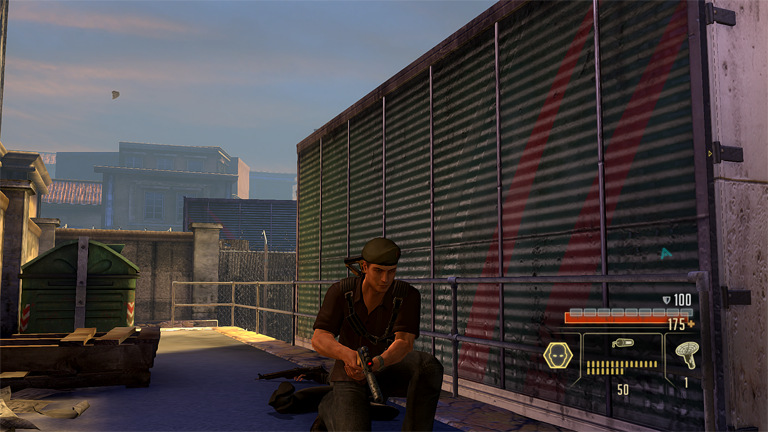
Missions take place on small-ish maps I would deem Open World 3s (Microcosms of interestingness). They are broadly linear, with multiple paths leading to the same objectives, but offer enough of variety in approach to remain fun and interesting. Every now and again, the game also throws in unique scenarios like, say, a section where you are observing a meeting through binoculars, or (my favorite) a visit to a certain Gelatto store.
(I reeeally want to describe it, because that single, brief vignette neatly sums up the essence of what makes AP great; but if you're going to give Alpha Protocol a try, I want you to experience it for yourself without any preconceptions)
Dispatching your opponents can take the form of a stealth takedown (lethal or non), gunplay (with silenced pistols, subsonic rifle ammunition, tranq darts, or white phosphorous shotgun shells offering some variety); gadgetry (which ranges from a noise-thrower you can use to distract guards, to high explosives), or hand-to-hand combat.
Once you get past the stilted mechanics, the game is a marvel to behold. The writing is first-rate (penned by Chris Avellone, no less, so – what'd you expect?); the story is even-keeled and true-to-life enough not to veer into Hitman overacting, or Metal Gear Solid's exaggeration (no super-soldiers here, thanks); the characters are engaging and memorable (here's looking at you Steven Heck); and player agency is king.
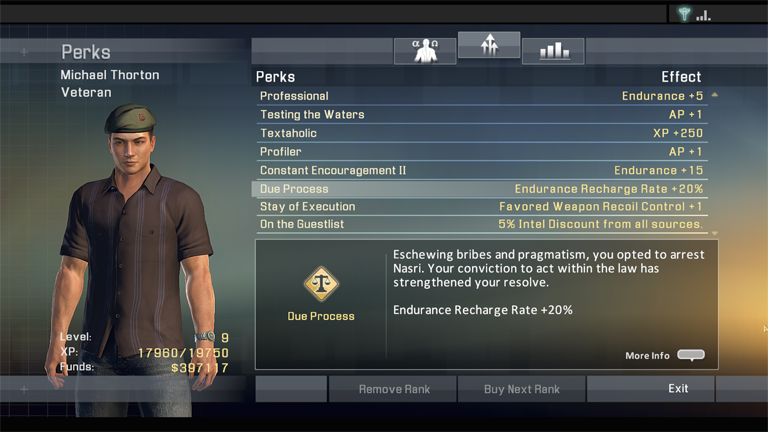
No matter how you play or what you do, the game will reward you for it. Arrest a mission target like you're supposed to? You get "Due Process" and your endurance regenerates faster. Kill 'em and go against orders? You get "Any Last Words...?" and your offensive abilities take less time to recharge. Sneak by people? You're harder to spot. Get shot a lot? You take less damage. The game's perk system is obsessively thorough and seems to account for any possible variation of key decisions or playstyles. My favorite perk I earned the first time I played the Soldier background. I had spent two previous playthroughs sneaking around, trying to be subtle, but – for the Soldier – I dispensed with finesse and just went in guns blazing every time.
AP rewarded me with a perk called "Real Men Don't Hide". Because (and I quote) "Unabated violence is a perfectly acceptable alternative to stealth." Nine years later, that still makes me smile.
Alpha Protocol's story straddles a nice middle ground between cut-and-dry, "real" spy thrillers and the realm of absolute fiction. Organizations and individuals have goals and motivations that they stick to. Equipment and locations are dramatized equivalents of what you may find in real life. And at no point does the story veer into science fiction territory, remaining a nice, consistent, even ride. And while the boss fights may belie belieavability (like a drug-snorting maniac that gets supercharged every time he takes a hit, or a tank top clad mercenary strutting around a firefight with a light machine gun), they do it in a fun way that fits the narrative.
In true spy thriller fashion, most NPCs aren't what they at first appear to be. Characters you depend on and trust may turn out to be your sworn enemies, whereas others who seem heartless and cruel, may become allies further down the line. There are entire sections of gameplay you will not even see if you don't make certain decisions, and one memorable opportunity to turn the entire narrative on its head.
On the whole, while I recognize that it is not without its faults, I love AP to bits and think it was unfairly treated by reviewers on release. Sure, it had some bugs, unpolished controls, and maybe it was a bit on the short side (it's more of a fast-paced novella than a book); but none of those shortcomings were sufficient to earn the game 2 out of 5 stars (from the now-defunct Joystiq) or 2 out of 10 (from Destructoid).
If you like spy yarns with good, solid writing, gameplay you can approach as you like, memorable characters, and a plot that always seems to have One More Secret To Uncover, give Alpha Protocol a try. You might have to root around eBay for a physical copy (sadly, despite having some SEGA games, GOG doesn't carry it); but the game runs fine on Win7 without any tweaking.
In the world of PC spy thriller action RPGs Alpha Protocol stands alone for a reason: doing the genre justice – with a dynamic plot, a responsive perk system, intel gathering, action, intrigue and all the rest of it – is complex, costly, and time consuming (which is why so few spy RPGs exist and so many FPS "spy" games abound). But just because AP did not clear every objective, doesn't mean its mission was a failure – and it remains this pig's favorite PC spy game to date.
Pig Recommends:
-
The Eiger Sanction, The Loo Sanction and Shibumi by Trevanian – honestly, I could wholeheartedly recommend anything by Rodney William Whitaker (aka. Trevanian, when he was writing modern day thrillers), but only those three are spy-ish; with Eiger and Loo, while parodying the spy thriller genre, he managed to create works that were better than their source material; Shibumi, on the other hand, is a contemplative masterpiece; word of warning, though: good as they are, Trevanian's books are harsh and uncompromising; if you are a fan of happy endings — steer clear; if, on the other trotter, you don't mind knowing that your finer feelings will, at some point, be shattered into countless jagged pieces, start with Eiger (Loo is its sequel) or skip straight to Shibumi; just don't say I didn't warn you: the man was allergic to optimism;
-
Sneakers – the 1992 classic remains one of my favorite movies of all time (spying or otherwise), with a great score (Branford Marsalis and James Horner), an ensemble cast, a crafty plot with enough foresight to seem ahead of its time (it's a movie about hacking before Hackers made it cool), and dialogue that still cracks me up; best of all? it has a nice message — something we can all use more of, times being what they are;
